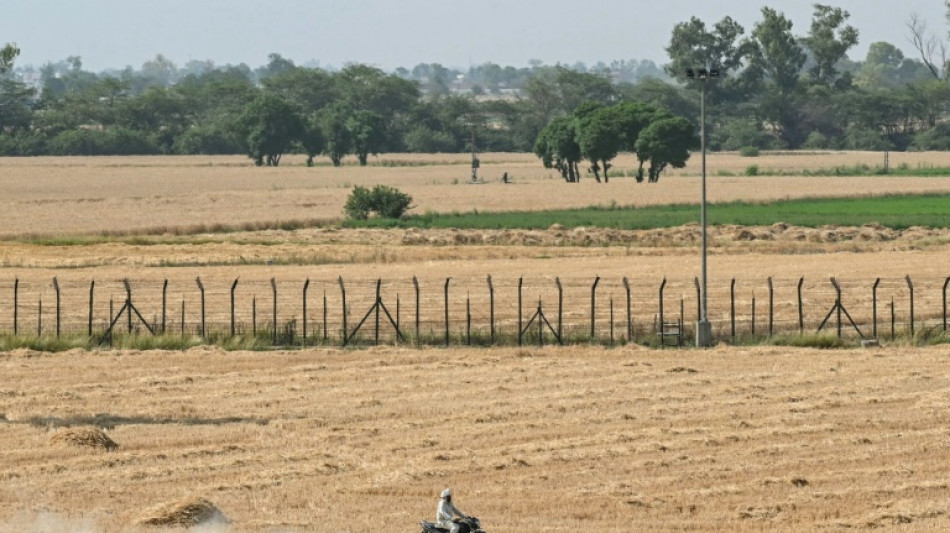
-
 Syria's Druze take up arms to defend their town against Islamists
Syria's Druze take up arms to defend their town against Islamists
-
Tesla sales plunge further in France, down 59% in April

-
 US calls on India and Pakistan to 'de-escalate'
US calls on India and Pakistan to 'de-escalate'
-
Israel reopens key roads as firefighters battle blaze

-
 Europe far-right surge masks divisions
Europe far-right surge masks divisions
-
James will mull NBA future after Lakers playoff exit

-
 Ukraine's chief rabbi sings plea to Trump to side with Kyiv
Ukraine's chief rabbi sings plea to Trump to side with Kyiv
-
Australian mushroom meal victim 'hunched' in pain, court hears

-
 Lakers dumped out of playoffs by Wolves, Rockets rout Warriors
Lakers dumped out of playoffs by Wolves, Rockets rout Warriors
-
Booming tourism and climate change threaten Albania's coast

-
 US reaching out to China for tariff talks: Beijing state media
US reaching out to China for tariff talks: Beijing state media
-
Tariffs prompt Bank of Japan to lower growth forecasts

-
 Kiss faces little time to set Wallabies on path to home World Cup glory
Kiss faces little time to set Wallabies on path to home World Cup glory
-
Serbian students, unions join forces for anti-corruption protest

-
 Slow and easily beaten -- Messi's Miami project risks global embarrassment
Slow and easily beaten -- Messi's Miami project risks global embarrassment
-
Fan in hospital after falling to field at Pirates game

-
 Nuclear power sparks Australian election battle
Nuclear power sparks Australian election battle
-
Tokyo stocks rise as BoJ holds rates steady

-
 Bank of Japan holds rates, lowers growth forecasts
Bank of Japan holds rates, lowers growth forecasts
-
'Sleeping giants' Bordeaux-Begles awaken before Champions Cup semis

-
 Napoli eye Scudetto as Inter hope for post-Barca bounce-back
Napoli eye Scudetto as Inter hope for post-Barca bounce-back
-
Germany's 'absolutely insane' second tier rivalling Europe's best

-
 PSG minds on Arsenal return as French clubs scrap for Champions League places
PSG minds on Arsenal return as French clubs scrap for Champions League places
-
UK WWII veteran remembers joy of war's end, 80 years on

-
 Myanmar junta lets post-quake truce expire
Myanmar junta lets post-quake truce expire
-
Rockets romp past Warriors to extend NBA playoff series

-
 Messi, Inter Miami CONCACAF Cup dream over as Vancouver advance
Messi, Inter Miami CONCACAF Cup dream over as Vancouver advance
-
UN body warns over Trump's deep-sea mining order

-
 UK local elections test big two parties
UK local elections test big two parties
-
US judge says Apple defied order in App Store case

-
 Seventeen years later, Brood XIV cicadas emerge in US
Seventeen years later, Brood XIV cicadas emerge in US
-
Scorching 1,500m return for Olympic great Ledecky in Florida

-
 Israel's Netanyahu warns wildfires could reach Jerusalem
Israel's Netanyahu warns wildfires could reach Jerusalem
-
Istanbul lockdown aims to prevent May Day marches

-
 Formation Metals Announces Appointment of Adrian Smith to Advisory Committee
Formation Metals Announces Appointment of Adrian Smith to Advisory Committee
-
Cerrado Gold Announces Q4 And Annual 2024 Financial Results

-
 Australian guard Daniels of Hawks named NBA's most improved
Australian guard Daniels of Hawks named NBA's most improved
-
Mexico City to host F1 races until 2028

-
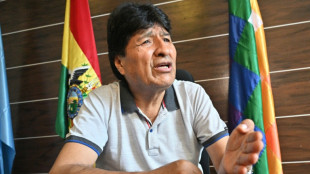 Morales vows no surrender in bid to reclaim Bolivian presidency
Morales vows no surrender in bid to reclaim Bolivian presidency
-
Ukraine, US sign minerals deal, tying Trump to Kyiv
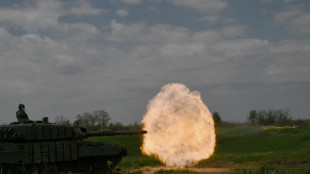
-
 Phenomenons like Yamal born every 50 years: Inter's Inzaghi
Phenomenons like Yamal born every 50 years: Inter's Inzaghi
-
Ukraine, US say minerals deal ready as Kyiv hails sharing
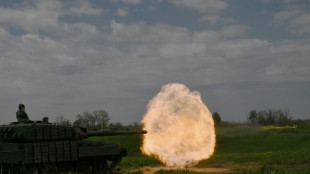
-
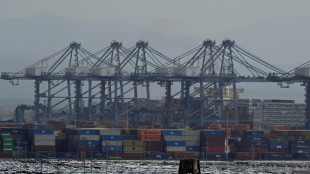 Global stocks mostly rise following mixed economic data
Global stocks mostly rise following mixed economic data
-
O'Sullivan says he must play better to win eighth snooker world title after seeing off Si Jiahui

-
 Sabalenka eases past Kostyuk into Madrid Open semis
Sabalenka eases past Kostyuk into Madrid Open semis
-
Netflix's 'The Eternaut' echoes fight against tyranny: actor Ricardo Darin

-
 US economy unexpectedly shrinks, Trump blames Biden
US economy unexpectedly shrinks, Trump blames Biden
-
Barca fight back against Inter in sensational semi-final draw

-
 Meta quarterly profit climbs despite big cloud spending
Meta quarterly profit climbs despite big cloud spending
-
US Supreme Court weighs public funding of religious charter school


Villagers on India's border with Pakistan fear war
India's Daoke village is fenced from Pakistan on three sides and 65-year-old resident Hardev Singh, who has lived through multiple wars between the arch-rivals, knows the drill if another erupts.
"All women, children, cattle and most younger men moved back to safe shelters in 1999 and 1971," Hardev said, referring to two of the worst outbreaks of fighting between the neighbours.
"We couldn't go to our fields," he said, adding that it was only the village's elderly men who "stayed back to ensure that our homes were not looted".
Relations between the nuclear-armed neighbours have plummeted after India accused Pakistan of backing the deadliest attack in years on civilians in Indian-administered Kashmir on April 22.
Islamabad has rejected the charge, and both countries have since exchanged gunfire across the de facto frontier in contested Kashmir, diplomatic barbs, expelled citizens and ordered the border shut.
Residents of the frontier villages in India's Punjab state say nothing has changed on the ground yet -- but there is a growing anxiety about the coming weeks.
"The barbaric attack on the civilians in Kashmir was tragic, but no matter what, the lives lost are not coming back," Hardev said.
"Any war would push both our countries back by many years, and there would be an even bigger loss of human lives."
A border fence patrolled by troops slices in two the farmlands near Daoke, home to around 1,500 people.
Gurvinder Singh, 38, recalls the last major conflict in 1999.
Fighting then took place far from Punjab -- in the icy Himalayan district of Kargil -- but the sun-baked fields around his village did not escape unscathed.
"Mines were planted on our fields, and we could not work," Gurvinder said.
He hopes that, if the bellicose statements issued by leaders on either side do turn into military action, his village will be left alone.
"We feel that the actual conflict would happen only in the Himalayas," Gurvinder said, adding that his village is "normal right now".
- 'Not just us' -
In the nearby frontier village of Rajatal, between the Indian city of Amritsar and Lahore in Pakistan, residents remember the days when the golden farmland stretched without restriction.
The frontier was a colonial creation at the violent end of British rule in 1947 which divided the sub-continent into Hindu-majority India and Muslim-majority Pakistan.
Sardar Lakha Singh's memory stretches back to before the fence was erected.
"We used to go to the open ground on the other side to graze our cattle," 77-year-old Lakha said, sitting about 100 metres (328 feet) from fences topped with barbed wire.
Farmers can obtain special passes to go close to the border, including beyond the fence but still within Indian territory.
But they must always be accompanied by a soldier.
"We can't go there whenever we want," said farmer Gurvil Singh, 65. "This reduces the time we get to work on our fields".
Panic gripped border villages last week after rumours suggested farmers would be stopped from accessing fields too close to Pakistan.
Sikh elder Sardar Lakha Singh advised younger villagers to accept their fate and not to worry.
"Whatever is going to happen will happen anyway," he said.
"We didn't know when the 1965 war suddenly started, same in 1971 when the planes suddenly started crossing the border," the grey-beared farmer added.
"So, if it happens again, we don't need to worry in advance."
Gurvinder Singh, 35, said he tried to take the lesson to heart.
"It would be a high-tech war, and not an invasion or a battle of swords like the past," he said.
"When the situation worsens, it would be for the entire country -- and not just us."
D.Kaufman--AMWN